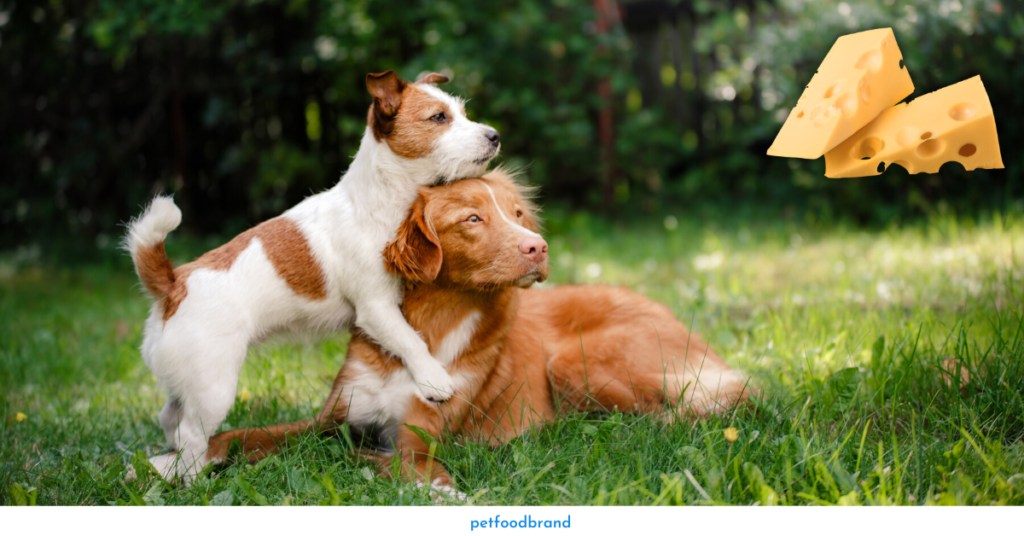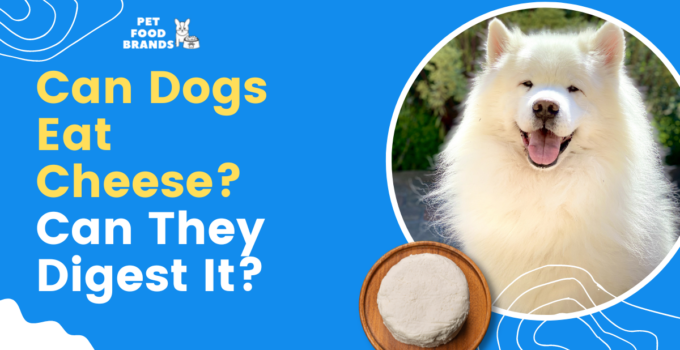Yes, dogs can eat cheese given that you serve it in moderation. It is not toxic. However, dogs lack the lactase enzyme that helps in cheese digestion. Overeating cheese can result in gastrointestinal problems. So, cheese is good for your dog as an occasional treat only.
One ounce of cheese contains 120 calories, 8g protein, 6g fat, and 180 mg calcium.
Health benefits of cheese for dogs
- Cheese contains protein, fatty acids, vitamin A, B-complex vitamins
- You might be surprised to know that cheese is loaded with calcium, a mineral that is necessary for healthy bones & healthy teeth development. With dogs spending time outside walking or playing, your dog would do well with some calcium in its snack.
- Fatty acids help to sustain healthy skin, boast a significant immune system, and promote cell growth in dogs. If your dog is not getting these essential fatty acids in their diet, there may be an underlying deficiency that you can address by taking them to the vet for testing.
- Making vitamin A a part of your dog’s diet is important. This vitamin aids in maintaining healthy skin, coats, and muscles as well as healthy nerves.
- Vitamin B complex is necessary for the assimilation of carbohydrates, protein, and fat. It is a vital source of energy for dogs.
Risks
Cheese is a high-fat food, which could make your dog gain weight and lead to obesity if you feed too much.
Overdoing it on cheese is not so good for your dog’s health, as it could lead to pancreatitis, a serious and potentially fatal illness.
Some cheeses may contain things like garlic, onions, and chives that could be toxic to dogs.
Dogs don’t have the same digestive system as humans as they lack lactase enzymes that help in the digestion of dairy products. It might be a good idea to avoid including cheese in their regular diet.
How to serve cheese to a dog?

- Before you feed your dog cheese, be sure to consult your vet. This will help protect them from any harmful or allergic reactions and keep them happy & healthy.
- Cottage cheese and mozzarella are great options for dogs. They are low in fat while still being delicious enough to please most pups. Goat cheese, feta, and brie might be too much fat for them.
- Don’t add spicy cheese to dog food. It can upset their stomachs.
- If your pet has never had cheese before, you can start by feeding them a small amount to see how they react. After introducing them to cheese, you can continue to feed your dog tiny amounts of it & watch out for any side effects from it.
- There’s no better way to make your dog work for a treat than to hide cheese in their food. It will entice your furry friend & likely make them want to linger on their food longer.
Is cottage cheese good for dogs?
Yes, dogs can eat cottage cheese as an occasional treat as it contains less quantity of fat. Cottage cheese is also a great option for dogs with an upset stomach. Cottage cheese mixed with white rice helps provide a good balance of protein and nutrients that can help your dog feel better.
Can dogs eat cream cheese?
No, dogs should not eat cream cheese regularly as it contains more fat than Cottage cheese and mozzarella. It is only good when served as an occasional treat.
Which type of cheese is bad for dogs?
Any cheese containing fat more than 5g is bad for dogs even as an occasional treat. It includes cream cheese, blue cheese, Swiss cheese, goat cheese, cheddar cheese, American cheese, feta cheese, provolone cheese, and Jack cheese.

Ankita is a passionate pet lover and head of content at Pet Food Brands. With her extensive knowledge and research, she provides pet owners with top-quality information on dog food and nutrition. Her dedication to improving the lives of dogs makes her a leading voice in the industry.




